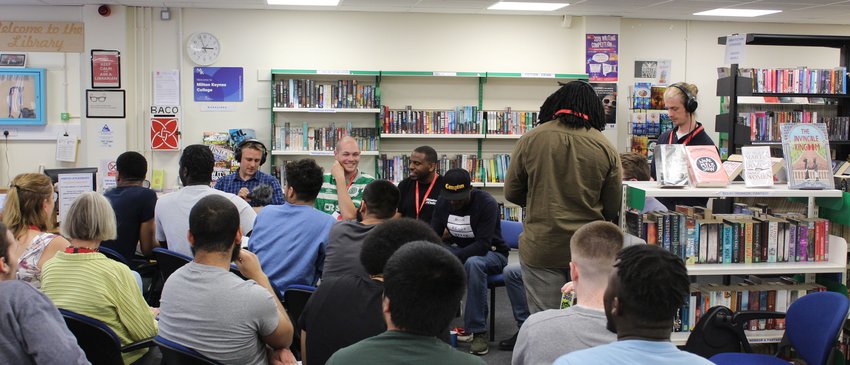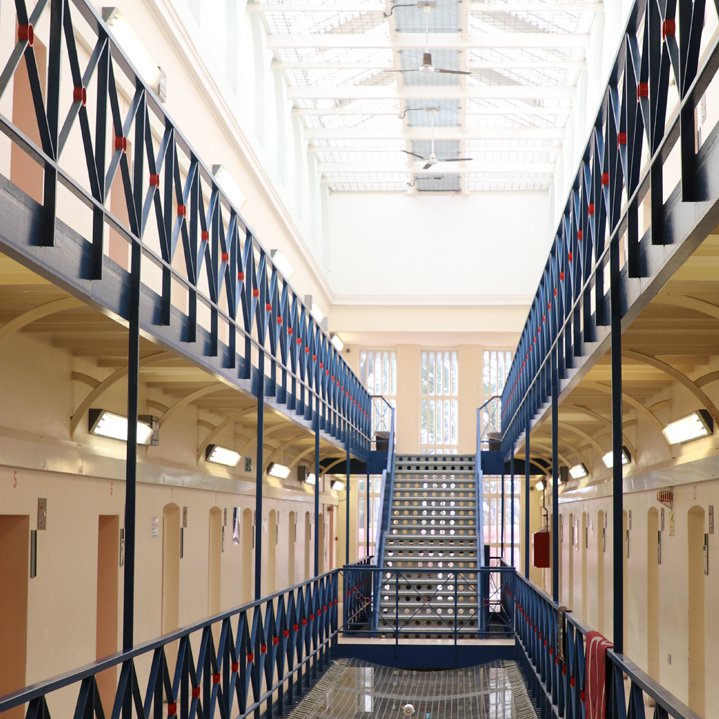New Chapters

About the programme
New Chapters offers young people and adults who are serving custodial sentences a space in which they can exercise creative freedom, find their voice, develop their literacy and communication skills and, most importantly, feel heard.
Through New Chapters, we collate an annual anthology and organise writing competitions to showcase the work of participants, with the support of National Prison Radio. Together with partners like Buckinghamshire Culture, we seek to build connections between people in custody and the local community through creative writing.
New funding from the Youth Endowment Fund announced
We are excited to announce that we have received funding from the Youth Endowment Fund to assess the impact of our New Chapters creative writing programme, which we will deliver in three Young Offenders Institutions (HMYOI Feltham, HMYOI Werrington and HMYOI Wetherby) and one Secure School (Oasis Restore) over the next two years.
The New Chapters Anthology 2024
Our most recently published New Chapters Anthology 2024 is a stunning body of work which showcases the talent of the year's cohort from prisons and Young Offender’s Institutions. The anthology is a brilliant way to celebrate the creative writing of participants across the project, and each contributor receives two copies to keep. We also share the anthology as widely as possible, ensuring copies are available in every prison library. We hope to gather feedback from those who read the anthology to send directly to the writers featured in it. The breadth and quality of writing is incredible and is testament to the talent behind prison walls.
Tell us what you think of the anthology
If you would like to read and feedback on the work, please email us at criminaljustice@literacytrust.org.uk and quote the code (for example ‘NCAYL5’) which appears in the top right hand corner of the page to identify the piece(s) you are giving feedback on.
A "tool for life"
Malcolm attended our creative writing sessions for two years while serving a sentence at HMP Brixton. He had never written creatively before attending the sessions but came along with an open mind. Before long, he was talking about how incredible writing was for him as a tool to process his feelings and emotional responses.
Previously, when he received bad news or experienced something unpleasant in the prison, he would become frustrated and upset. However, with the outlet of creative writing, Malcolm now had a way of channelling his feelings into words on the page. A few sessions in and he was writing constantly - always bringing new pieces to the sessions to share with the group.
Malcolm described creative writing as a 'tool for life' that he never knew existed and that he would always have with him.
What does the New Chapters programme involve?
-
Creative writing workshops
A diverse programme of writing workshops led by authors with lived experience of the criminal justice system and other issues facing young people in custody.
-
Giving out free books
We work with publishers to donate books to prison libraries and give New Chapters participants signed books of their own to keep. -
Working with National Prison Radio
National Prison Radio broadcasts audiobooks and interviews with authors, along with recordings of New Chapters participants themselves.
-
Writing competitions and anthologies
Participants are encouraged to submit their writing to competitions, with the winners getting the chance to read their work for broadcast on National Prison Radio. We also collate their writing in anthologies which we publish each year.
-
Creating mini libraries on each wing
Giving easier access to books, these are refreshed monthly with additional new titles chosen by those taking part.
-
Links with the local community
We work with Buckinghamshire Culture and other partners to showcase the young people's writing in local libraries and at literary festivals. We aim to establish shared writing groups to connect prison residents with the local community.
"We propose that low literacy holds a relationship with crime because it exacerbates risk factors associated with offending: negative experiences of education, exclusion and truancy, poor attainment and poor employment outcomes all hold a relationship with poor literacy skills."
National Literacy Trust's 'Literacy Changes Lives' report (2014)
The need
Literacy levels among the prison population remain significantly lower than the general population.
- Nearly two-thirds (62%) of people entering prisons have low literacy. This is more than four times higher than in the general adult population (Prison Reform Trust, 2021).
- 47% of people in custody have no educational qualifications at all (Prison Reform Trust, 2021).
People in custody often have a poor relationship with education.
- This is particularly true for children and young people – nearly nine out of 10 children (89%) in YOIs said they had been excluded from school. (Her Majesty's Inspectorate of Prisons, 2019).
- Those with low literacy are more likely to be excluded from school and more likely to truant. 9% of very poor readers are persistent truants compared to 2% of those who are average or above average readers. (National Literacy Trust’s Literacy Changes Lives report, 2014).
Engagement with educational opportunities can significantly reduce (re)offending.
- The proven one year reoffending rate is 34% for prisoner learners, compared to 43% for people who don’t engage in any form of learning (Ministry of Justice and Department for Education, 2017).
- Despite this, only 1% of youth offenders in custody for 12 months or longer achieved 5 or more GCSEs A*-C (Ministry of Justice and Department for Education, 2016).
